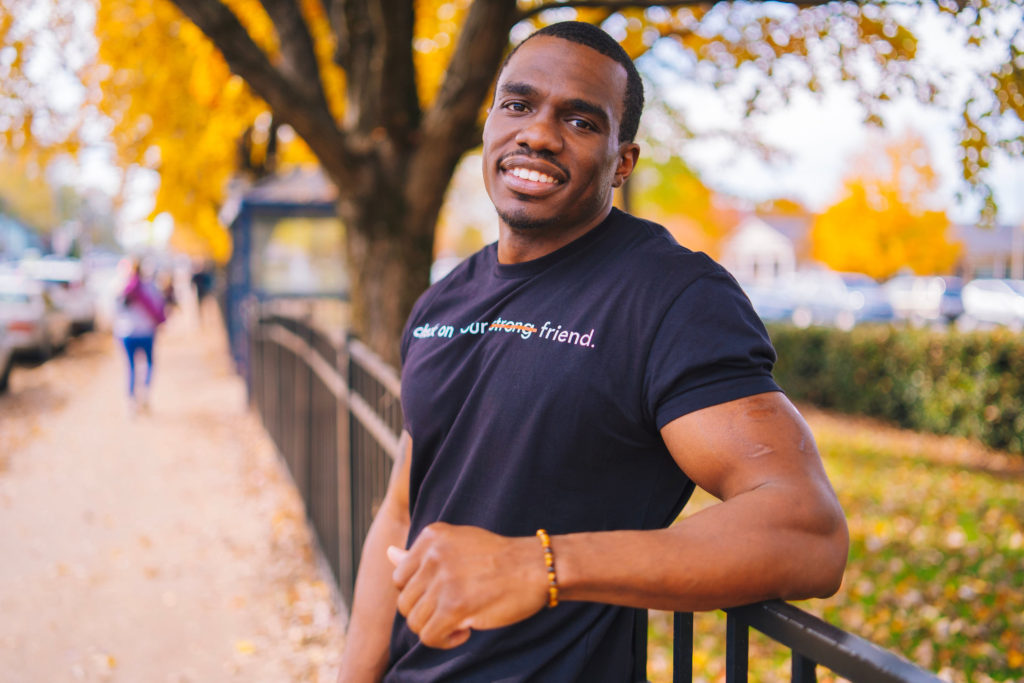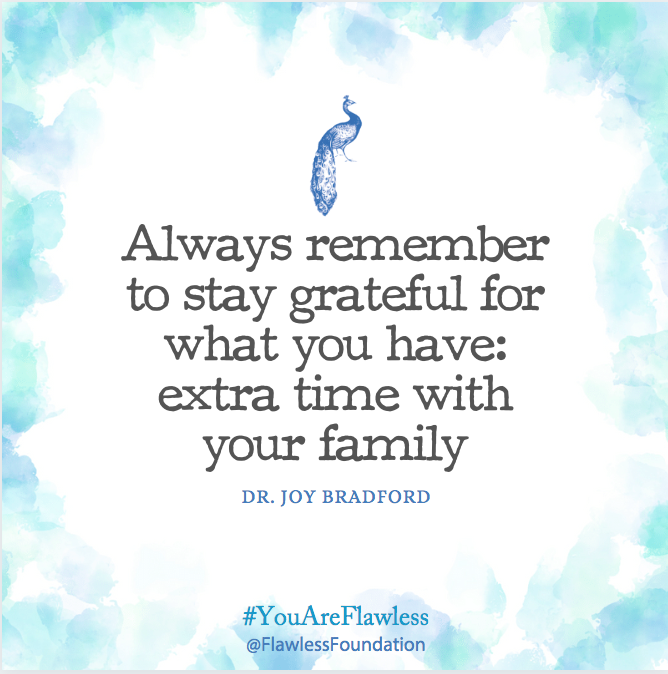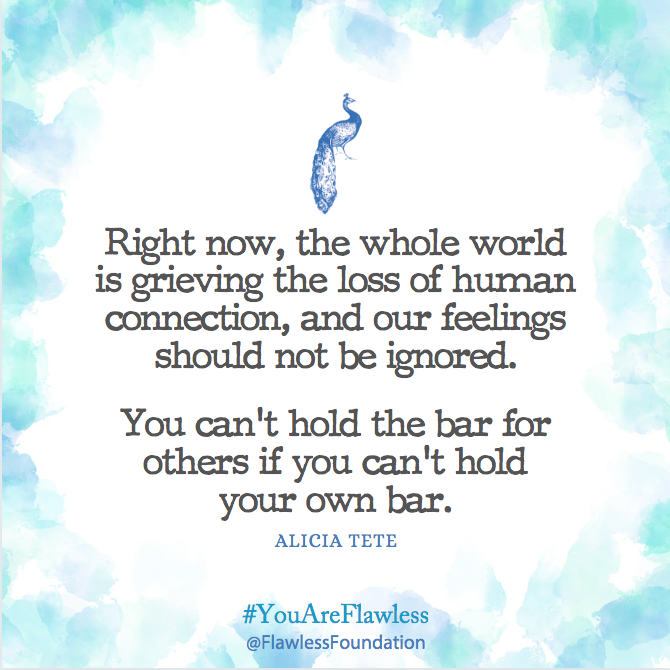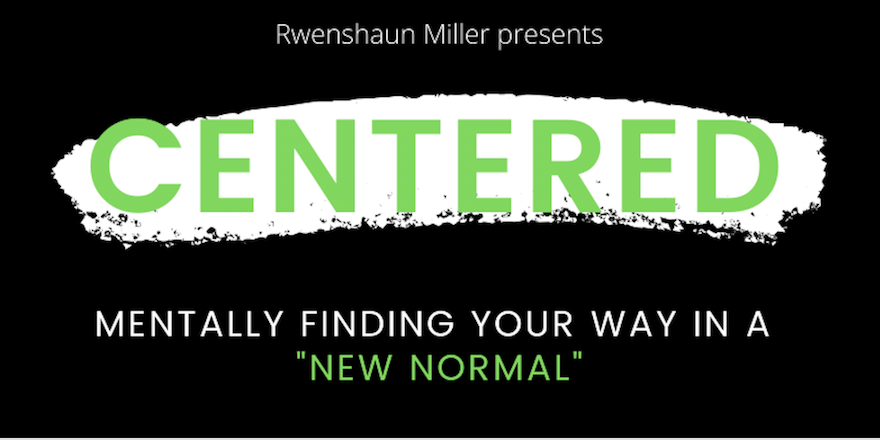By Abby Cooper
Flawless Intern

During this unprecedented time, Rwenshaun Miller – psychotherapist, mental health change agent, author and speaker who lives with Bipolar Disorder – is helping others by sharing his knowledge and inviting other professionals and those with lived experience to speak. In his digital conference, Centered: Mentally Finding Your Way in a New Normal, Rwenshaun was joined by other experts in discussing how taking this time to pause and address any issues can help people function effectively in this difficult situation.
Dr. Joy Bradford, founder of Therapy for Black Girls and resident psychologist for O Magazine, discussed how parents can navigate the dual roles of parent and teacher during this time. As the mother of two young boys, Dr. Bradford has learned the importance of having grace with yourself. She reminds us that it’s impossible to recreate a true classroom experience for children (so don’t beat yourself up over this), and also that educational value can be found in everyday living. While staying healthy and safe is the top priority, online resources are a great tool for parents to be creative with education.

Dr. Bradford says the best strategy for handling the often-overlapping needs of work and parenting is to focus on the priority at any given moment; when you’re working, focus on work, and when you’re parenting, focus on the kids. You can help create boundaries between “parent mode” and “work mode” by explaining to children (who are old enough to comprehend) when you are available and unavailable during certain times of the day. While kids do best with structure and predictability, you don’t need to set a rigid schedule for this to be effective. Set priorities and keep some consistency, but don’t feel that you need to be a “super parent” – there’s no such thing!
Mental health should be a top priority for the whole family: take breaks consistently, monitor negative self-talk, and keep realistic expectations. Especially in single parent homes, it’s OK to relax the rules a little bit, like with screen time and snacks, without spiraling into “Mommy guilt”; you’re doing your best, which is the most any of us can do! And always remember to stay grateful for what you have: extra time with your family.
Omar Davis, founder of Crashbell, teaches children to be more self-aware by combining active movements, yoga, and meditation, while also developing social-emotional learning through class culture and peer engagement. How can we continue to foster these skills in children during this time? Ask open-ended questions about how they are feeling, because kids may not have the language or vocabulary to label their emotions. Children may be able to connect their feelings with a certain place in their body; anger may be felt in the hands, sadness in their stomach, or anxiety in their head. Recognizing emotional reactions and encouraging open communication allows children to express their feelings and can help everyone understand what different “trigger points” exist. This allows recognition of what your feelings are, as well as where they are coming from.
Davis has homeschooled his 7 year old son all year, yet he acknowledges that shifting into a world where everyone is homeschooled has still presented certain challenges. His family has set realistic expectations of what this period will look like, allowing for down time and encouraging meditation, which can be very simple – even taking a few deep breaths can help with reflection and relaxation. Davis also emphasizes that kids should understand the boundaries between work time and down time, and he is using this period as an opportunity for self-evolution. As Davis quoted, “You can’t solve a problem from the mind in which it was created”.
Paul Bashea Williams, LCSW, is a relationship advisor and author of the book Dear Future Wife: A Man’s Guide and a Woman’s Reference to Healthy Relationships. He emphasized the importance of keeping open communication with the people in your life, especially your significant other, during this time. Have an honest discussion about your needs and how to collaboratively manage your new living situation. If you are living together, it’s important to set boundaries and find new ways to have privacy, because being together all the time can be challenging for any relationship. On the other hand, not being able to see your significant other can be difficult, and it’s important to acknowledge that. Your conflict resolution style might need to change too; address any issues soon (but not immediately) after they come up to avoid stewing in negative thoughts and emotions while allowing some time for reflection on the conflict.
Beyond life at home, life at work has changed drastically, with many businesses moving exclusively online. Rwenshaun and Nedra Tawwab of Kaleidoscope Counseling analyzed the main concerns of business owners and employees: our society values productivity very highly, yet during this time it may be difficult to remain as productive while working from home because of the simultaneous caretaking responsibilities many workers have. Tawwab says it’s OK to take breaks for yourself; you might feel you need to use all available time to work and be productive, but it is important to have some downtime, which will make your working time more efficient, and allow you to generally function better. As we address this collective trauma, finding your personal process and respecting other forms of operation is key.

As a life stress counselor, Alicia Tete addressed the fact that our culture does not grieve well. Right now, the whole world is grieving the loss of human connection, and our feelings should not be ignored. As our society goes through the stages of grief, it’s important not to take the actions of others personally – everyone has their own grieving process. Tete also emphasized that “you can’t hold the bar for others if you can’t hold your own bar”. Coming so soon after the death of Kobe Bryant, this crisis shows that it’s OK to have “unauthorized” grief: you are allowed to be upset about whatever you are upset about. Your experience is yours. However, be aware of grief spilling into depression. Be aware of your losses, hear other perspectives, be introspective, and understand that things will get better.
Anita Phillips, a trauma therapist who works at the intersection of mental health, faith, and culture, was the event’s final speaker. Phillips views our current situation through two lenses: the cognitive perspective of psychology, and the emotional perspective of faith. Faith and spirituality are dimensions of our worldview, and not exclusively through religious beliefs. Not being able to connect to faith during quarantine can lead to spiritual pain. Return to traditions that have brought you comfort in the past, and find community however possible. Striving for 100% positivity with zero struggles during this time is nearly impossible; it’s important to practice kindness and allow people to work on their wellbeing whatever their current situation may be.







